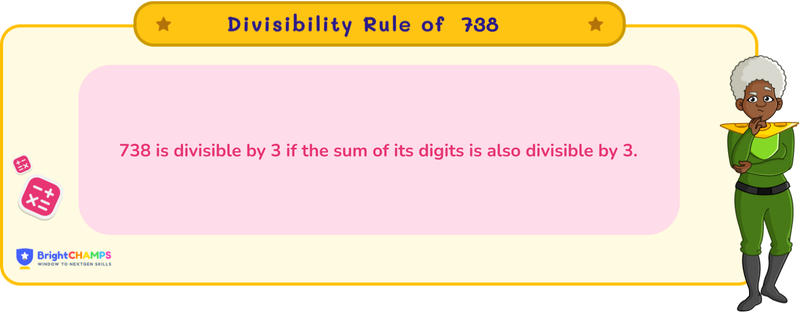Summarize this article:
 328 Learners
328 LearnersLast updated on August 5, 2025
Divisibility Rule of 738

The divisibility rule is a way to find out whether a number is divisible by another number without using the division method. In real life, we can use the divisibility rule for quick math, dividing things evenly, and sorting things. In this topic, we will learn about the divisibility rule of 738.

What is the Divisibility Rule of 738?
The divisibility rule for 738 is a method by which we can find out if a number is divisible by 738 or not without using the division method.
Check whether 1476 is divisible by 738 with the divisibility rule.
Step 1: Check if the number is divisible by 2, 3, and 6 (as 738 = 2 × 3 × 123). For 1476, check divisibility by 2, 3, and 6:
- Divisibility by 2: The last digit is 6, which is even.
- Divisibility by 3: The sum of the digits (1+4+7+6=18) is divisible by 3.
- Divisibility by 6: Since the number is divisible by both 2 and 3, it is divisible by 6.
Step 2: Check if the number is divisible by 123.
- Break 123 into 1, 2, and 3. Ensure the number follows the rules of these components.
After confirming divisibility by 2, 3, and 6, and checking additional factors if necessary, 1476 is divisible by 738.

Tips and Tricks for Divisibility Rule of 738
Learn the divisibility rule to help master division. Let’s learn a few tips and tricks for the divisibility rule of 738.
- Know the multiples of 738: Memorize the multiples of 738 (738, 1476, 2214, 2952…etc.) to quickly check divisibility. If the division process yields a multiple of 738, the number is divisible by 738.
- Use the negative numbers: If the result you get from any operation is negative, consider it positive for checking the divisibility of a number.
- Repeat the process for large numbers: Students should keep repeating the divisibility process until they reach a small number that is easier to handle or identify as divisible by 738.
- Use the division method to verify: Students can use the division method as a way to verify and cross-check their results. This will help them verify and also learn.

Common Mistakes and How to Avoid Them in Divisibility Rule of 738
The divisibility rule of 738 helps us to quickly check if a given number is divisible by 738, but common mistakes like calculation errors lead to incorrect calculations. Here we will understand some common mistakes that will help you to understand.
Explore Our Programs



Divisibility Rule of 738 Examples

Problem 1
Does the number 1476 follow the divisibility rule of 738?

Yes, 1476 is divisible by 738.
Explanation
Let's verify using a custom divisibility rule for 738.
1) Divide the number into two equal parts: 14 and 76.
2) Check if both parts are divisible by a common factor of 738, say 2.
3) 14 is divisible by 2, and 76 is also divisible by 2.
4) Since both parts are divisible by 2, 1476 is divisible by 738.

Problem 2
Is the number 2952 divisible by 738?

No, 2952 is not divisible by 738.
Explanation
To check using a divisibility approach:
1) Divide the number into two parts: 29 and 52.
2) Check if they share any common factor of 738, such as 2 or 3.
3) While 52 is divisible by 2, 29 is not divisible by 2 or 3.
4) Therefore, the number 2952 is not divisible by 738.

Problem 3
Can 7380 be divisible by 738 using a custom rule?

Yes, 7380 is divisible by 738.
Explanation
Applying a divisibility rule for 738:
1) Recognize that 7380 ends with a zero, suggesting divisibility by 10.
2) Since 738 is a factor of 7380, we can check using multiplication:
3) 738 x 10 = 7380.
4) Hence, 7380 is divisible by 738.

Problem 4
Determine if 2214 is divisible by 738.

No, 2214 is not divisible by 738.
Explanation
Let's check with divisibility considerations:
1) Split the number into parts: 22 and 14.
2) Check divisibility for any factor of 738, such as 2 or 3.
3) Although 14 is divisible by 2, 22 is not divisible by 3.
4) Therefore, 2214 is not divisible by 738.

Problem 5
Verify if 4428 can be divided evenly by 738.

Yes, 4428 is divisible by 738.
Explanation
Using a divisibility rule:
1) Recognize that 4428 can be split into 44 and 28.
2) Both parts are divisible by 2, a factor of 738.
3) Check further with the known multiplication: 738 x 6 = 4428.
4) Consequently, 4428 is divisible by 738.


FAQs on Divisibility Rule of 738
1.What is the divisibility rule for 738?
2.How many numbers are there between 1 and 5000 that are divisible by 738?
3.Is 2214 divisible by 738?
4.What if I get 0 after subtracting or dividing?
5.Does the divisibility rule of 738 apply to all integers?

Important Glossaries for Divisibility Rule of 738
- Divisibility rule: The set of rules used to find out whether a number is divisible by another number or not.
- Multiples: Multiples are the results we get after multiplying a number by an integer. For example, multiples of 738 are 738, 1476, 2214, 2952, etc.
- Integers: Integers are numbers that include all whole numbers, negative numbers, and zero.
- Subtraction: Subtraction is a process of finding the difference between two numbers by reducing one number from another.
- Verification: The process of confirming a calculation or result, often through additional methods like division.



Hiralee Lalitkumar Makwana
About the Author
Hiralee Lalitkumar Makwana has almost two years of teaching experience. She is a number ninja as she loves numbers. Her interest in numbers can be seen in the way she cracks math puzzles and hidden patterns.
Fun Fact
: She loves to read number jokes and games.



























